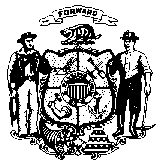

WISCONSIN LEGISLATIVE AUDIT BUREAU
AUDIT SUMMARY
Report 98-5
May 1998
DIVISION OF GAMING
The Division of Gaming within the Department of Administration administers and regulates the State's racing, Indian gaming, and charitable gaming activities. We completed a financial audit and issued an unqualified opinion on the Division's fiscal year (FY) 1995-96 and FY 1996-97 financial statement. However, our analysis of gaming revenues and expenditures raised concerns about significant declines in pari-mutuel taxes, which are collected by the Racing program, and questions about the adequacy of the Division's administrative cost allocation process.
Pari-mutuel Tax Revenue Continues to Decline
Pari-mutuel tax revenue, which is deposited directly in the General Fund for
legislative appropriation, has declined from $4.7 million in FY 1994-95 to
$3.6 million in
Additional Funds Could Be Transferred to Agricultural and Livestock Programs
Statutes require racing proceeds to be used first to fund agricultural and livestock programs in the Department of Agriculture, Trade and Consumer Protection. Any excess funds are then transferred to the General Fund. The calculation of racing proceeds available for transfer is affected by Racing program expenditures, which are determined in part by the Division's procedures for allocating administrative costs.
We found that when the Division allocates administrative costs among its three programs, the Indian Gaming and Charitable Gaming programs are not assessed their full share of the salary and fringe benefit costs for administrative staff whose responsibilities are related to all gaming programs. Instead, these administrative costs are absorbed entirely by the Racing program, despite its declining revenues. If employe-related administrative costs had been allocated according to work effort, Racing program expenditures would have been lower than currently reported, and we estimate that an additional $164,500 in racing proceeds would have been available for agricultural programs and educational programs related to livestock. Both the Indian Gaming and the Charitable Gaming programs have had adequate balances to pay their share of administrative costs, but they have not had sufficient expenditure authority to do so.
Indian Gaming Revenue Will Increase Significantly in the Future
As a result of the renegotiated gaming compacts, the State's Indian Gaming revenue will increase significantly in the future. Currently, 11 tribes pay a total of $350,000 annually as reimbursement for the State's regulatory costs. However, beginning in FY 1999-2000, three tribes that have already renegotiated their gaming compacts will pay the State at least $5.5 million annually. The Division's cost allocation process will become increasingly important as the Legislature considers how these and any additional funds received through the renegotiated compacts should be appropriated. Therefore, to provide assurance that all gaming regulatory costs are fully recovered and charged to the appropriate program, we have recommended that the Department of Administration develop an equitable process to allocate administrative costs to all its gaming programs and seek the necessary expenditure authority from the Legislature to cover these costs.
****
| View Full Summary | Go to LAB Reports Page | Go back one page |